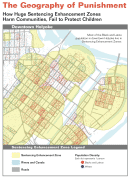
The Geography of Punishment:
How Huge Sentencing Enhancement Zones Harm Communities, Fail to Protect Children
by Aleks Kajstura, Peter Wagner, and William Goldberg
Prison Policy Initiative
July 2008
Section:
Vermont’s unique sentencing enhancement zone statute emphasizes that the zone laws should be highly specific and only one of many responses to drugs
Vermont’s unique sentencing enhancement zone statute emphasizes that the zone laws should be highly specific and only one of many responses to drugs
In 2003, Vermont passed its own school zone statute and enhanced penalties for certain drug offenses, but crafted the legislation far more carefully than most states. We reprint here the Vermont legislature’s findings which explain their intent, as well as some selections from the statute which illustrate the care taken to tailor the law to the specific problem the legislators sought to address.
Sec. 1. LEGISLATIVE FINDINGS
The General Assembly finds:
(1) An effective, comprehensive approach to combating drug crimes and substance abuse must include substantial education and prevention strategies, strong criminal enforcement of the drug laws, and sufficient treatment and recovery options and resources. This act focuses primarily on one aspect of such an approach, criminal enforcement, yet the General Assembly is committed to establishing a coordinated plan which includes substantial resources in prevention, treatment, and recovery as well, in order to provide the best possible strategy to combat illegal drug use in Vermont.
(2) Many people who become addicted to illegal drugs resort to small-scale sale of drugs to support their addiction. This act is not directed at those people, but rather at the entrepreneurial drug dealers who traffic in large amounts of illegal drugs for profit. Such persons pose the greatest threat to the health and safety of Vermonters and should be subject to heightened criminal penalties for their activities.
(3) While tough criminal penalties for persons who intend to sell large amounts of illegal drugs are vitally important, the state cannot effectively stem the tide of illegal drugs coming into the state unless there is a concerted effort to limit the demand for illegal drugs in Vermont. To do this, there must be a commitment to providing substantial resources for drug abuse prevention, intervention, treatment, and recovery.
(4) The sale of illegal drugs to minors is a predatory and insidious practice that threatens to destroy young lives. Providing enhanced penalties for the sale of drugs to a minor sends a strong and clear message that the General Assembly will not tolerate such practices and may serve as a deterrent to those who would otherwise seek to recruit young people in hopes of making a profit from their addiction.
(5) Substance abuse by youth under the age of 21 is on the rise and contributing to an increase in criminal activity committed by these youths. The traditional punitive approach to combat criminal and delinquent acts by persons with substance abuse problems, although sometimes useful as a short-term rehabilitation tool to encourage treatment, will be unsuccessful if it is not combined with appropriate treatment services….
—2003 Vermont Law P.A. 54. An act relating to selling or dispensing illegal drugs
The resulting Vermont statute creates an incentive for drug dealers to avoid selling drugs to or near children without making other people subject to the enhanced penalty. The statute does not apply to people sharing drugs or people just over 18 selling drugs to slightly younger people.[1] The Vermont law serves as a geographic deterrent because the law’s scope is limited and does not blanket the entirety of urban areas. Vermont’s enhancement zones are smaller than most states’ — 500 feet — and apply only to properties that are adjacent to schools.[2] This provision makes the zones easier to identify and thereby encourages potential drug dealers to move away from protected areas.
Endnotes
[1] 18 V.S.A. §4237(a) Dispensing regulated drugs to minors. A person knowingly and unlawfully dispensing any regulated drug to a minor who is at least three years that person’s junior shall be sentenced to a term of imprisonment of not more than five years.
[2] 18 V.S.A. §4237(d) The selling or dispensing of a regulated drug to a person on property abutting school property is a violation under this section only if it occurs within 500 feet of the school property. Property shall be considered abutting school property if:
(1) it shares a boundary with school property; or
(2) it is adjacent to school property and is separated only by a river, stream, or public highway.
Events
- April 15-17, 2025:
Sarah Staudt, our Director of Policy and Advocacy, will be attending the MacArthur Safety and Justice Challenge Network Meeting from April 15-17 in Chicago. Drop her a line if you’d like to meet up!
Not near you?
Invite us to your city, college or organization.



